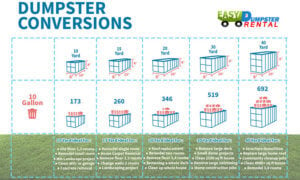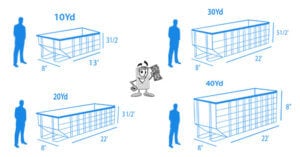October 26, 2018 / by EasyDumpsterRental
Filed Under: Uncategorized
Types of dumpsters: helping you get what you need
 There are a wide variety of reasons why a person may need a dumpster. More commonly, a person gets a dumpster or dumpsters as a more long-term thing. Other times, it may be for a small-time thing, which generally turns out to be a one-time thing or just short-term. When picking out a dumpster – whether it be a permanent thing or a temporary thing, a large dumpster or a small dumpster – you need to make sure that you get the dumpster that works best for you. In turn, we will help you pick it out.
There are a wide variety of reasons why a person may need a dumpster. More commonly, a person gets a dumpster or dumpsters as a more long-term thing. Other times, it may be for a small-time thing, which generally turns out to be a one-time thing or just short-term. When picking out a dumpster – whether it be a permanent thing or a temporary thing, a large dumpster or a small dumpster – you need to make sure that you get the dumpster that works best for you. In turn, we will help you pick it out.
What dumpsters work best for one-time operations?
In the event that you just need a dumpster for a single occasion, something like a rental service is likely going to be your best bet. In doing so, you can rent it just for the amount of time you need it – ie, if you are throwing a large party or you need a dumpster when throwing out a large amount of trash from a building you are cleaning out. And if you need the dumpster for longer than you intended, you can just as well extend the rental period.
The type of dumpsters are important too
Mind you, there is a lot more to think about than whether or not you need it one time or for even longer than that. There are also other types of dumpsters for you to choose from. One of the more common of these dumpsters are dumpsters meant for residential garbage. These dumpsters are commonly used, as the name might imply, for residential waste. The kinds of people who might get these dumpsters usually are going to be landlords for shared living spaces (such as a duplex or an apartment complex). You might also see these kinds of dumpsters at transfer stations.
Size matters
 When all is said and done, one of the most common types of variances in dumpsters is going to be the size of the dumpsters. While dumpster size may not seem like a big deal, it most certainly is. Basically, the kind of dumpster you get – whether you purchase it or rent it – is going to depend on the amount of waste that is being generated.
When all is said and done, one of the most common types of variances in dumpsters is going to be the size of the dumpsters. While dumpster size may not seem like a big deal, it most certainly is. Basically, the kind of dumpster you get – whether you purchase it or rent it – is going to depend on the amount of waste that is being generated.
Dumpsters sorted for different materials
It is not at all uncommon to see someone use multiple, categorized dumpsters to help sort different types of materials. There is a multitude of reasons for this. Most commonly, it’s just for convenience. There are a lot of companies or individuals who may just well use one dumpster for all materials, but there are others who will use multiple dumpsters because they may need to dispose of certain types of refuse separately from other types. Some removal companies may not be inclined to deal with a mess of trash and would expect in turn that your trash neatly.
Getting separate dumpsters for ethical reasons
For both individuals and corporations, you will find a number of them who take their disposal of waste seriously for ethical reasons. This is because of people’s worry about the environment and their impact on it. This concern has grown more significant in recent decades due to rising evidence of a human-caused impact on the environment, so some people take charge to avoid wasting recyclable materials. While there is a debate about whether climate change is a thing, and if it is whether humankind is making a substantial impact on it, a number of people either believe the data or figure “better safe than sorry.”
Categorization for health and safety reasons
This kind of categorization, you would expect to see more often in a hospital setting or an elder care facility. Both for medical waste and biohazardous waste, you definitely are advised to find someone who is able to handle either or. Mismanagement of these things can be highly dangerous, as can it be if you throw out these things with regular waste depending on what is being thrown out.
Medical waste should be discarded separately from regular waste because of the kinds of things it may carry. Disease, infection, etcetera, the kind of stuff that you definitely do not want to have this “get out into the wild” as it were. Things like medical equipment and anything that may have come into contacts with potentially hazardous substances like blood. Biohazardous waste works in much the same way, as you might expect. A lot of biohazardous waste confers the same issues of medical waste – ie, it’s the kind of stuff that you do not want to expose other people to. Biohazardous waste covers similar issues – infections, blood, etc. However, it also covers things such as radioactive materials.
Mind you, this is not just a moral or ethical reason to not mix your medical waste with regular waste, it is also a legal reason. Not all states have the exact same laws that govern how you are supposed to dispose of medical waste, but a lot of states may put their foot down if they were to find out about improper disposal thereof.
Understanding your state’s various laws
Back in 1988, a law was passed giving the Environmental Protection Agency (EPA) authority over the disposal of medical waste. This was called the “Medical Waste Tracking Act,” and it lasted for three years until it expired in 1991. As such, regulation of medical waste disposal is the responsibility of state-level agencies. However, this is on a more general level; some aspects of medical waste disposal is given to certain agencies when applicable. For example, the EPA still has authority over things like the technologies designed to reduce the risk levels of medical waste.
As discussed above, medical waste disposal is regulated on a state level, but no state is guaranteed to have the same laws as another. Working with a company that handles medical waste and is well-versed in the laws of respective states is a good way to avoid getting in trouble for any mistakes or missteps.